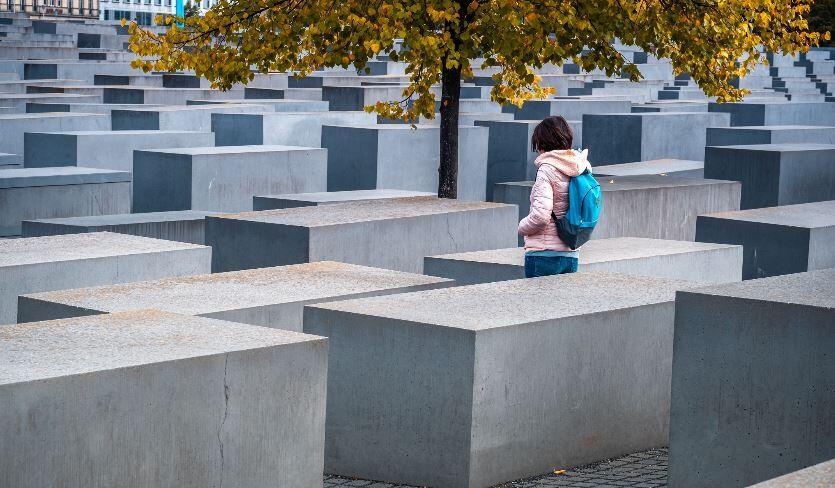Germany’s Foreign Office website confirms its “unique relationship with Israel. This stems from Germany’s responsibility for the Shoah, the systematic genocide of 6 million European Jews under National Socialism.” It goes on to say that “since diplomatic relations were established … the relationship between the two countries has continuously been deepened and grown stronger, both at the official level and in the sphere of civil society,” adding that “the unique nature of German-Israeli relations is a cornerstone of German foreign policy.”
It identifies the Goethe Institute and Israel’s Yad Vashem as cornerstones of Germany’s “culture of remembrance.”
That might all be true in the virtual world, but the facts on the ground paint a different, deeply troubling picture.
The Goethe Institute, the key cultural global outlet for the German government, announced it was convening in Tel Aviv, Israel a panel discussion on the Holocaust, Nakba, and German remembrance culture, under the title “Grasping the Pain of the Others.” The date chosen was November 9, the anniversary of the 1938 Kristallnacht pogrom that set the stage for the Nazi Holocaust.
The announcement ignited furious protests from survivors and Jewish groups worldwide, including the Simon Wiesenthal Center. We urged Israeli Prime Minister Yair Lapid, the son of a Holocaust survivor, to demand that the event be canceled.
In response to the firestorm of protest, the Goethe Institute apologized for convening the event on Kristallnacht, but not for hosting the panel. Indeed, instead of canceling, the Goethe institute moved the event the November 13.
That decision was as infuriating and worrisome as the original announcement. The host, it turns out, was embarrassed only by its selection of the date, and remains committed to the underlying thesis of the program – that one can connect the Nakba to the Shoah.
That fits well with a carefully nurtured and now deeply embedded lie, believed by millions of Germans and Europeans, that what the Nazis did to the Jews in the 1930s and 1940s, the Jewish state is now inflicting on the Palestinians in 2022. In other words, Israelis are today’s Nazis.
The fact that the German government’s key cultural entity was totally comfortable hosting an event sponsored by the Rosa Luxemburg Foundation, with a program sure to open the floodgates of Holocaust distortion and inversion, is a profound cause for alarm.
Such behavior mocks the memory of the Shoah and does a disservice to Palestinians by setting up a narrative that presents pernicious propaganda as serious discourse.
If the Israelis and Zionists are today’s Nazis, they should be attacked on the streets of Berlin, London, and Los Angeles. Germans may read that last year there was another 29% spike in antisemitic crimes in their cities – 3,027 in 2021. But why should they care? After all, they weren’t alive during World War II, let alone personally linked to Nazi Holocaust. In addition, in 2022, human rights NGOs like Amnesty International paint Israel as an apartheid state and antisemitic diplomats are given free rein to crank out one-sided anti-Israel resolutions at the UN Human Rights Council and General Assembly. Meanwhile, the German cultural elite, instead of rallying behind beleaguered Jewish citizens, greenlighted and defended a prestigious art exhibition rife with ugly antisemitic stereotypes.
And German Jews woke up on the anniversary of Kristallnacht to this catchy campaign on the KFC app: “Memorial Day of the Reichspogromnacht [Kristallnacht]: Treat yourself to more tender cheese with the crispy chicken. Now at KFCheese!”
Any wonder why a prominent German Jewish leader just announced he can’t live in Germany anymore? He’s leaving for Israel and urging the rest of German Jewry to follow.
It’s small solace that Dani Dayan, chairman of Yad Vashem, had to personally intervene with the secretary-general of the Goethe Institute to cancel the event entirely.
Before it is too late, it’s time for Germany’s political and cultural elite to denounce all those who facilitate the demonization of Israelis; time to hold antisemites accountable for their deeds and crimes, whether from far right neo Nazis, Islamists, or Jew-haters from the far left; time to end blatant antisemitic exhibitions to dress up pornographic Jew-hatred as artistic freedom; time for all German states, cities, and municipalities to fully adopt and implement the International Holocaust Remembrance Alliance definition of antisemitism; and to endorse the Bundestag vote that labeled the anti-peace Boycott, Divestment and Sanctions movement as antisemitic.
For decades, Germany and Israel and Jews the world over have worked hard to rebuild relations between our people in the wake of the Shoah. But where are the German voices today that rebuke those who demonize Zionists as Nazis at home, and that speak out in the face of the Iranian regime’s serial Shoah denial? Where is the public display of solidarity with Jews?
Eight decades after the Shoah, Germany must connect younger generations to the nation’s self-declared culture of memory, or it will wake up one day soon to see Hitler’s dream of a Germany that is Judenfrei, free of any Jews, become a reality.



